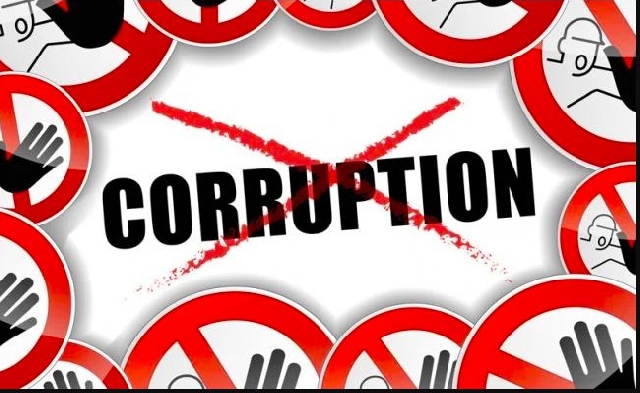Corruption, mismanagement, and economic despair: Why apologies and half-hearted reforms fall short
 corruption
corruption
The Principle of Double-Entry Accounting
In accounting, the principle that every debit must have a corresponding credit is fundamental. This concept ensures that the books are balanced, with every financial transaction reflecting an equal and opposite reaction. However, this principle extends beyond the ledger and offers a lens through which we can examine the flow of value, particularly in cases of corruption. When state actors engage in unscrupulous activities, the losses suffered by the populace correspond to gains for the corrupt. This article explores how these principles manifest in the economic mismanagement and corruption seen in Ghana’s economic crisis leading to the recent Domestic Debt Exchange Program (DDEP) under the Akufo-Addo/Bawumia government.
The Domestic Debt Exchange Program: A Mismanaged Economic Strategy
The DDEP, implemented by the Akufo-Addo/Bawumia government, was intended to restructure Ghana’s unsustainable debt levels. However, the program has been widely criticized for causing severe economic hardship, particularly for ordinary Ghanaians and pensioners. At a town hall meeting in Accra on August 6, 2024, the Finance Minister, Dr. Mohammed Amin Adam, issued an apology for the distress caused by the DDEP, admitting that it had plunged the country into severe economic difficulties. Yet, in a contradictory statement, he lauded the program as a success, claiming it was necessary for economic recovery….but at the expense of who?
This duality in messaging reflects a deeper issue: the losses incurred by the public through the DDEP were directly linked to gains for others, particularly those in positions of power who benefited from the economic mismanagement, overspending, corrupt and overpriced projects leading to the program’s implementation. While the populace bore the brunt of the economic pain, the state actors responsible for these policies seemed to be insulated from their consequences.
The Flow of Corruption: Losses for the Many, Gains for the Few
The economic principle that every loss corresponds to a gain becomes disturbingly clear when applied to the situation in Ghana under the Akufo-Addo/Bawumia administration. In this context, the losses suffered by the general populace are directly linked to the gains amassed by corrupt state actors. The Domestic Debt Exchange Program (DDEP) and the broader economic mismanagement have exacerbated this flow of corruption, creating a vicious cycle where the financial pain of ordinary citizens becomes the financial gain of the unscrupulous few.
Significant Financial Losses Through the DDEP
The DDEP, which was initially presented as a necessary measure to stabilize Ghana’s economy with a promise by the president that “There will not be a hair-cut”, has instead led to unprecedented financial losses for the public. In 2023 alone, investors in Ghana lost over GHS60 billion as a direct result of the program. This staggering loss reflects the broader economic disarray caused by the government’s inability to manage public finances responsibly. Pensioners, who relied on their savings for retirement, saw their investments slashed through painful "haircuts," losing a substantial portion of their life savings.
The losses were not limited to domestic investments. Ghanaian banks and individual investors also suffered devastating losses in the external and domestic debt market. The government's default on Eurobond payments, beginning in 2022, resulted in a 37% loss on investments for these stakeholders. These defaults not only wiped out the hard-earned wealth of many Ghanaians but also severely damaged the country’s reputation in the international financial markets.
Erosion of Purchasing Power Through Monetary Inflation
In addition to direct financial losses, Ghanaians have experienced a significant erosion of their purchasing power due to rampant monetary inflation. The government’s decision through Bank of Ghana to print GHS77 billion to finance its reckless spending spree has led to hyperinflation, peaking at 54.1% in 2022. This inflationary pressure has caused a dramatic increase in the cost of living, with food prices soaring to 69% in 2022 and basic goods becoming unaffordable for many.
For ordinary Ghanaians, this loss in purchasing power has been particularly devastating. As wages remained stagnant or even declined in real terms, the cost of necessities like food, housing, and healthcare has skyrocketed. The middle class has been squeezed into poverty, and those already struggling to make ends meet have found themselves plunged into deeper financial despair. The inflation crisis has not only diminished the value of money but has also eroded public trust in the government’s ability to manage the economy.
Losses Suffered by State Enterprises
The economic mismanagement of the Akufo-Addo/Bawumia administration has also taken a heavy toll on state-owned enterprises (SOEs), which have suffered staggering losses as a result of poor governance and corruption. COCOBOD, once a pillar of Ghana’s economy, has accumulated losses totalling GHS13.62 billion. This collapse has had a ripple effect across the agricultural sector, affecting the livelihoods of millions of cocoa farmers and undermining one of the country’s most important export industries.
Other state-owned enterprises have fared no better. Many have become insolvent, burdened with debt and unable to operate efficiently due to rampant corruption and mismanagement. The failure of these enterprises has not only resulted in significant financial losses but has also deprived the country of essential services and infrastructure that are critical for economic development.
The Mechanism of Corruption: How the Few Profit at the Expense of the Many
The financial losses endured by the majority of Ghanaians are not isolated incidents but are part of a broader mechanism of corruption that benefits a select few. The funds that should have been used for public investment and economic development have instead been diverted into the pockets of corrupt officials and their associates. These individuals have exploited the system for personal gain, often engaging in fraudulent schemes that siphon off public resources.
This flow of value is emblematic of a corrupt system where the losses of the many directly fuel the gains of the few. For instance, while ordinary Ghanaians lost billions through the DDEP and saw their purchasing power eroded by inflation, those in power continued to live lavishly, often at the expense of the public purse. These corrupt actors have benefited from contracts awarded without proper oversight, inflated procurement deals, and outright embezzlement of state funds.
Galamsey and Illegal Mining Kingpins in Government
Illegal mining, known locally as "galamsey," has wreaked havoc on Ghana's environment, primarily through the rampant pollution of water bodies. State actors, who are expected to safeguard the nation's natural resources, have been implicated in facilitating or turning a blind eye to these illicit activities. The unchecked extraction processes involve the use of harmful chemicals like mercury and cyanide, which seep into rivers and streams, contaminating drinking water and decimating aquatic ecosystems. This environmental degradation not only endangers biodiversity but also threatens the health and livelihoods of communities that depend on these water sources, illustrating a profound breach of public trust and responsibility.
Economic Mismanagement and Its Repercussions
The DDEP is just one example of the broader economic mismanagement by the Akufo-Addo/Bawumia government. Since 2017, Ghana’s public debt has ballooned from GHS120 billion to an astronomical GHS742 billion, with little to show for this debt accumulation. The government’s reckless borrowing, coupled with unsustainable debt levels, led to a series of economic crises, including:
Deliberate Money Printing: The Bank of Ghana printed GHS77 billion to finance government spending, leading to hyperinflation and the erosion of public trust in the financial system. Collapse of Indigenous Banks and Other Financial Institutions: The government’s vindictive actions against local banks resulted in a loss of confidence in the banking sector, leaving thousands of Ghanaians unable to access their locked-up funds.Bank of Ghana and Policy Solvency
Despite the Bank of Ghana's GH₵10.50 billion loss in 2023 being a notable improvement from the staggering GH₵60.9 billion loss reported in 2022, the situation remains deeply alarming. The 2022 losses were largely due to the impairment of the Bank's holdings of both marketable government stocks and non-marketable instruments, a direct result of the Domestic Debt Exchange Program (DDEP). This program, designed to address Ghana's unsustainable debt, instead led to a severe devaluation of assets held by the Central Bank, exposing its policy solvency to significant risk.
The magnitude of these losses raises critical concerns about the effectiveness of the Bank of Ghana’s board sub-committee responsible for risk management. This sub-committee is charged with identifying, assessing, and mitigating financial risks to maintain the institution's solvency and ensure the stability of its operations. However, the fact that the Bank was so heavily exposed to government debt, resulting in such drastic losses, signals a profound failure in these responsibilities.
The sub-committee’s inability to foresee and mitigate the risks associated with the government’s fiscal policies and the DDEP points to a significant breakdown in oversight and governance. This lapse has not only led to substantial financial losses but has also jeopardized the Bank’s capacity to execute its monetary policy functions, further destabilizing the economy.
The Broader Impact on Society
The consequences of this corruption extend far beyond the immediate financial losses. The erosion of trust in public institutions, the decline in investor confidence, and the overall degradation of the economic environment have created a vicious cycle of poverty and instability. As state enterprises collapse and the economy falters, the opportunities for ordinary Ghanaians to improve their standard of living diminish, leading to widespread disillusionment.
The systemic nature of this corruption means that any attempt to address the economic crisis must also confront the underlying issues of governance and accountability. Without meaningful reforms to curb corruption and ensure that public funds are used for the benefit of the entire population, rather than a select few, Ghana’s economic recovery will remain elusive.
Accountability and the Demand for Justice
The principle of double-entry accounting reminds us that every financial transaction must be accounted for, with losses and gains transparently recorded. In the case of Ghana’s economic crisis, the losses suffered by ordinary Ghanaians must be matched by accountability from those who have profited from their misery. The Finance Minister’s apology, while acknowledging the hardship caused by the DDEP, falls short of addressing the full extent of the government’s economic mismanagement.
Ghanaians deserve more than apologies; they deserve justice and accountability for the reckless borrowing, wasteful spending, and corruption that have devastated their economy. The losses incurred by the public must be reconciled with the gains made by those in power, ensuring that the balance sheet of Ghana’s economy is set right through genuine reform and a commitment to transparent governance.
Conclusion: The Need for Leadership Change and Structural Reform
The Domestic Debt Exchange Program and the broader economic mismanagement by the Akufo-Addo/Bawumia government highlight the devastating impact of corruption on Ghana’s economy. The principle that every debit must have a corresponding credit reveals how the losses of the many have been exploited to benefit a corrupt few. As the people of Ghana endure the ongoing hardship caused by these failed policies, it is clear that mere apologies and half-hearted reforms are not enough. What the nation urgently needs is a change in leadership—one that prioritizes genuine accountability, transparency, and the well-being of all citizens. Only with new, competent leadership committed to ethical governance can Ghana begin to rebuild its economy, restore public trust, and ensure that the gains of the nation truly benefit its people.
Source: Korsi Dzokoto






